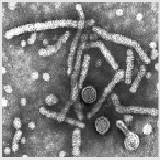Skip subpage navigation
 Hepatitis B is a liver infection caused by the hepatitis B virus. Hepatitis B is transmitted when blood, semen, or another body fluid from a person infected with the virus enters the body of someone who is not infected. This can happen through sexual contact; sharing needles, syringes, other injection equipment; or from mother to baby at birth.
Hepatitis B is a liver infection caused by the hepatitis B virus. Hepatitis B is transmitted when blood, semen, or another body fluid from a person infected with the virus enters the body of someone who is not infected. This can happen through sexual contact; sharing needles, syringes, other injection equipment; or from mother to baby at birth.
For many, especially children, hepatitis B infection is asympomatic. For some people, including most infected in infancy, hepatitis B can become a long-term, chronic infection. Chronic hepatitis B can lead to serious health issues, like cirrhosis or liver cancer.
The first dose of hepatitis B vaccine is given at birth, with the three-dose series completed between 6 and 18 months of age. Older children and adolescents who did not previously receive the hepatitis B vaccine should be immunized.
Source: Centers for Disease Control and Prevention
You will find below all of the resources you will need about the hepatitis B vaccine. More will be added as they are published or released.
| Advisory Committee on Immunization Practices Recommendations |
Date |
Hepatitis B Vaccine
|
April 1, 2022 |
You also may be interested in...
Fact Sheet
Aug 14, 2023
 .PDF |
131.52 KB
.PDF |
131.52 KB
This information paper describes the required number of doses, using various combinations of monovalent (single antigen) hepatitis A and hepatitis B vaccines and the bivalent (combination hepatitis A and hepatitis B) vaccine, to ensure adequate immunity against both diseases.
Fact Sheet
Dec 6, 2017
 .PDF |
102.14 KB
.PDF |
102.14 KB
This information paper describes hepatitis B virus and the vaccines to prevent it.
Fact Sheet
Aug 30, 2017
 .PDF |
68.86 KB
.PDF |
68.86 KB
This information paper provides immunization recommendations and resources for Department of Defense (DOD) personnel supporting disaster response operations, both in CONUS and OCONUS.
Fact Sheet
Oct 19, 2016
 .PDF |
76.33 KB
.PDF |
76.33 KB
This fact sheet provides the dosing schedule for MMR, Varicella, Hepatitis A and Hepatitis B vaccines.
You are leaving Health.mil
The appearance of hyperlinks does not constitute endorsement by the Department of Defense of non-U.S. Government sites or the information, products, or services contained therein. Although the Defense Health Agency may or may not use these sites as additional distribution channels for Department of Defense information, it does not exercise editorial control over all of the information that you may find at these locations. Such links are provided consistent with the stated purpose of this website.
You are leaving Health.mil
View the external links disclaimer.
Last Updated: May 10, 2024